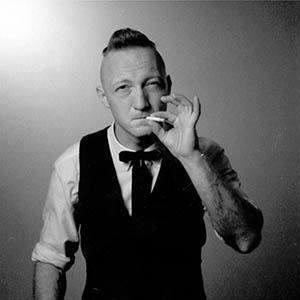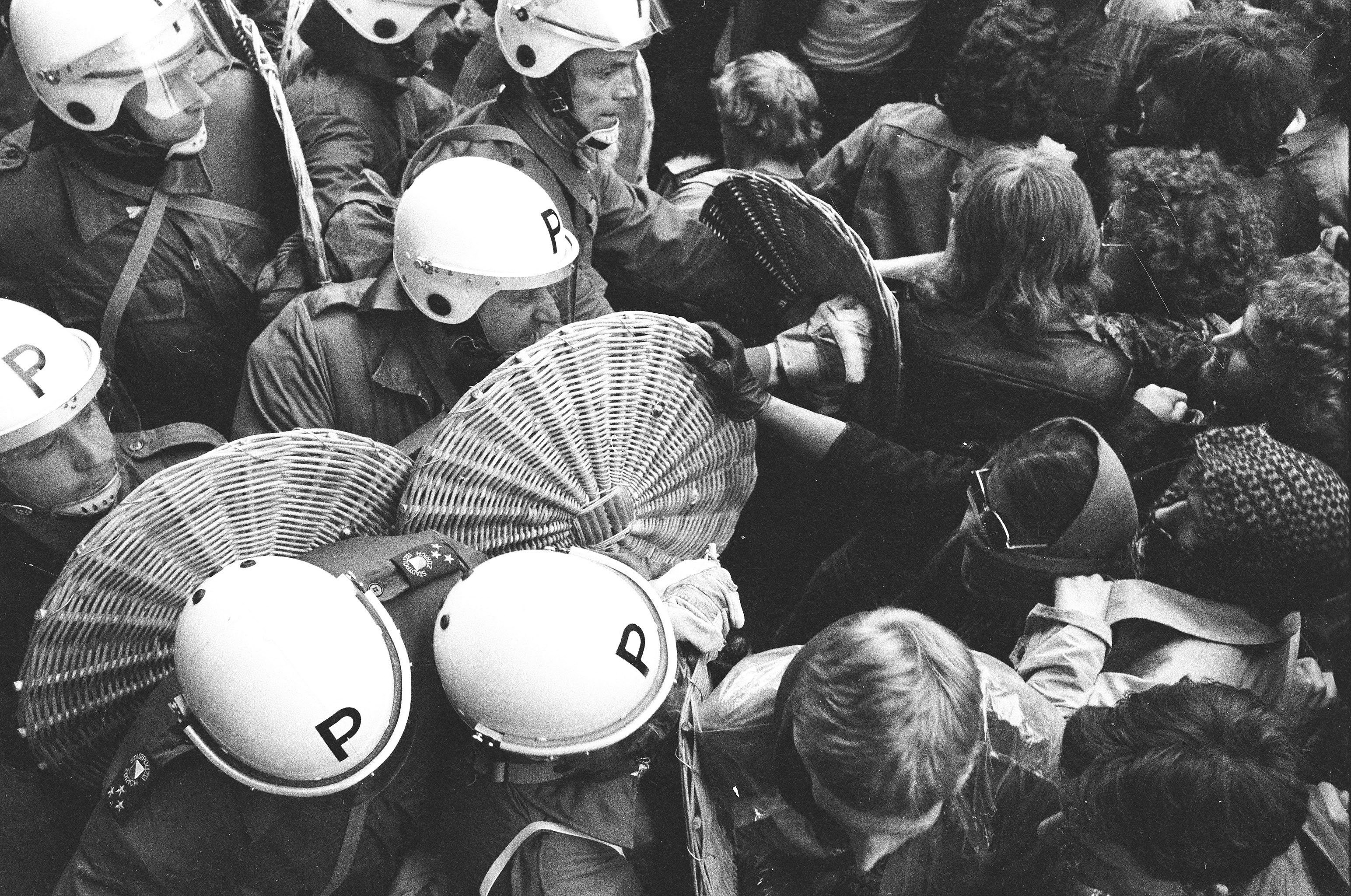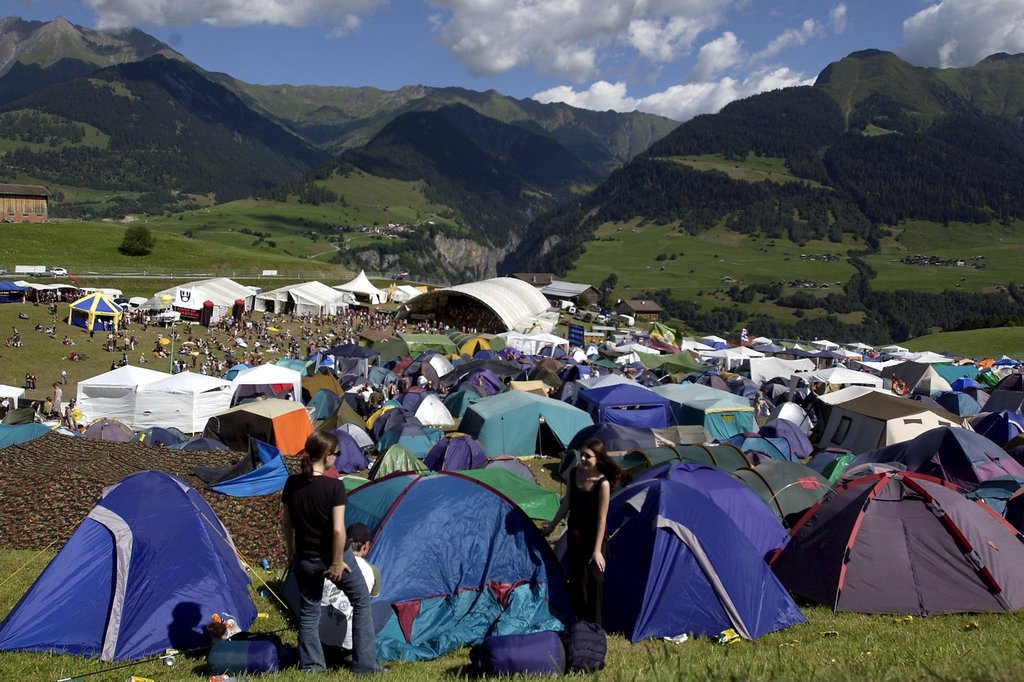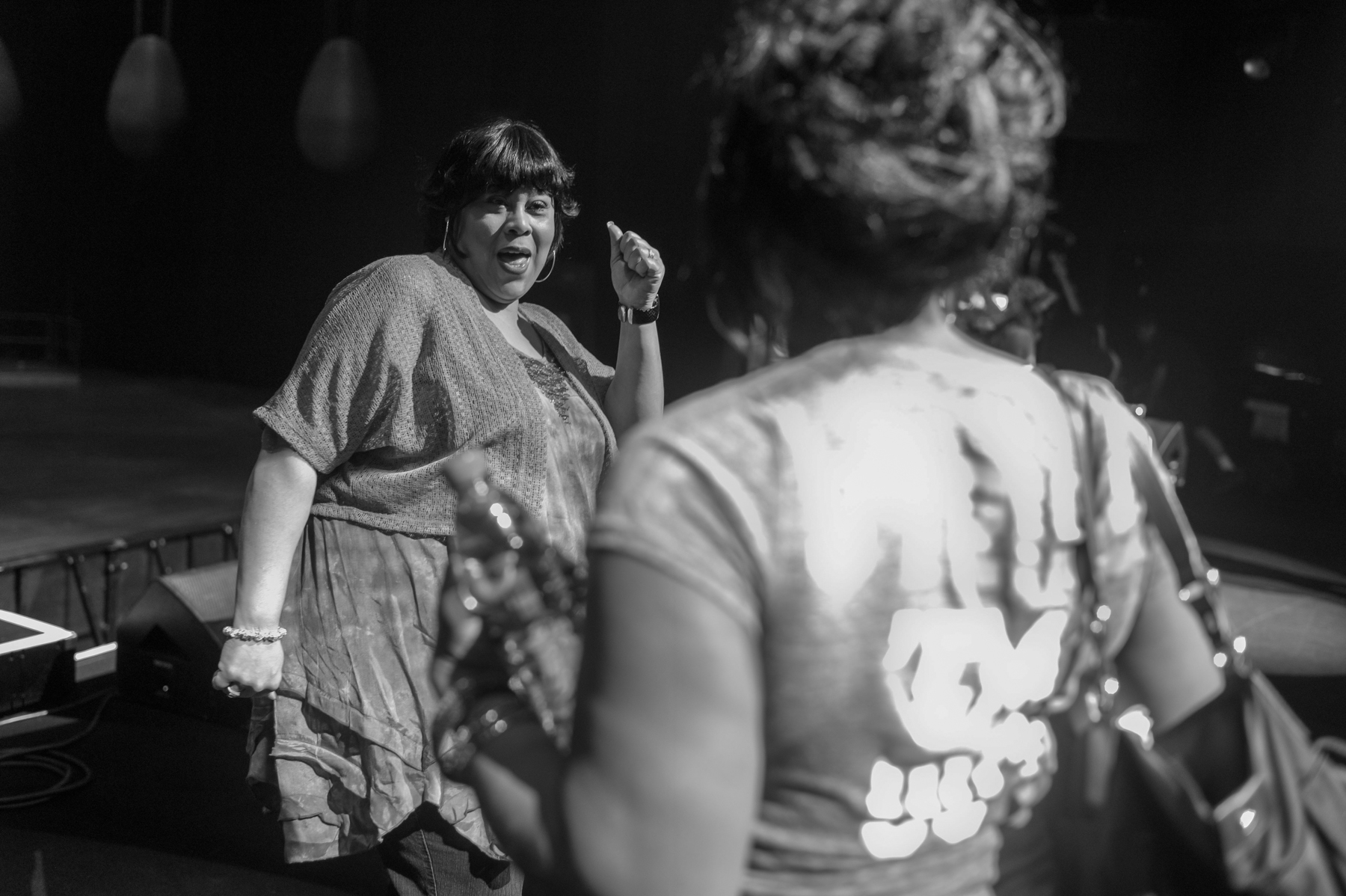Where mojo and money collide in Swiss pop

Ask anyone who are Switzerland’s pop pioneers and they’ll cite dance duo Yello and post-industrial group The Young Gods. Bands wanting to do the same today must first face the music industry blues.
In a cellar shop in Bern’s old town, a record player is playing 1920s blues. Women’s panties hang from the ceiling touting rock ‘n roll slogans. Bibles jostle for space alongside jars of Brylcreem, racks of T-shirts and stacks of vinyl. Welcome to the world of Reverend Beat-Man,External link one of Switzerland’s musical entrepreneurs.

The blues trash singer spent his teenage years running a bootleg cassette label before starting the bona fide Voodoo RhythmExternal link record label in 1992, having found it hard to put his own unusual music out and seeing other bands with the same problem.
The label has since put out hundreds of releases by Swiss and international acts. “I think we’ve sold a million records. It sounds a lot, but we are still really small,” Beat-Man says.
The 46-year-old divides his time between the label and pursuing his own musical career. He’s credited with creating an entirely new genre that fuses psychobilly with garage punk. Thanks to YouTube and Spotify he says he’s found fame abroad and regularly tours. And in the age of music streaming and falling album sales, that’s where as a musician he makes his money.

More
Reverend Beat-Man: Clown of the Town
“People don’t know what a product is any more. They’ve kind of lost it because it’s all digital, you can’t hold it in your hands. They come to a show and see the band is selling merchandise. And they say wow, it’s a product, something you take home and have forever. With a digital thing, if you have a computer crash, it’s gone. As a label we find it hard to preach that to people.”
Being a musician today is not for the faint hearted, Beat-Man agrees. Starting out for him meant “sleeping on toilet floors” and playing for little money for years. Only ten to 15 years later did the acceptable concert fees starting coming in.
Many Swiss bands typically have a day job. “In Switzerland it’s a big problem because you can make so much money with another job, you get 10,000 bucks easy here per month. As a musician you make maybe 2,000 bucks. And the rent is like 1,500 bucks. You have 500 bucks to live on. A lot of Swiss musicians don’t go that far. They probably just want an easy life.”
Elitist?
Daniel Fontana has been passionately watching the Swiss music scene for decades. His Bad BonnExternal link live music venue sits deep among farmers’ fields miles from any city, with loyal members trekking out to see a half-half mix of Swiss and international acts. For three days of the year it also welcomes 2,500 music fans for a festival of cutting-edge bands, with passes for the festival selling out in hours.
For him, contemporary pop music is “more a thing of the elite” in Switzerland. “There aren’t so many working class people in music. In most young bands it’s quite rare to have someone from the street. In Zurich most people I know are from richer families.”
For Fontana, bands are not progressing on two fronts. Either they are too comfortable and don’t move around the country enough or out of Switzerland, or they have unrealistic expectations of making it too quickly, demand high concert fees and give up when things get tough.
“We need crazy people to make good music. Most people are not crazy enough.”
YelloExternal link and The Young GodsExternal link – two groups to have broken out of Switzerland – started out as experimental bands and were not concerned initially about becoming a big act, Fontana points out.
Last year Fontana was one of the experts asked to identify the country’s leading musicians for the first national Grand Award for MusicExternal link. A final shortlist of 15 was chosen, ranging from classical to folk to experimental. Franz Treichler, frontman for The Young Gods, won the government’s CHF100,000 ($97,000) prize for his pioneering work over the past 30 years in music and the arts.
“For me it was important to nominate people who live what they do. Beat-Man or Franz [Treichler]. These guys live their music. They don’t think people should like what they do, they just do it. It [the award] was a kind of provocation for the music scene.”
The pioneers
In perhaps a sign that Swiss pop is finally coming into its own, Bern’s Museum of Communication is currently running the country’s first ever pop music retrospectiveExternal link.

More
Milestones in Swiss pop
It charts the evolution from the first girl group, the Honolulu Girls, from 1960 to the present day.

More
The Honolulu Girls
The overarching impression is that Swiss musicians have been largely influenced by music from elsewhere. A handful managed to go the other way though.
The Young Gods inspired the likes of David Bowie and U2’s the Edge. Kurt Cobain cited post punk group Kleenex as an influence, and today their songs are covered by rising American avant-punk group Deerhoof. Celtic Frost’sExternal link avant-garde metal meanwhile had echoes in other metal genres.
Electronic pioneers Yello inspired dance music with their electronics and use of samplers, as Paul HartnollExternal link of British dance duo Orbital told swissinfo.ch. “I would say they are in the top five of the early electronic stuff that used to get to me. I can remember hearing Yello and thinking what is that, what are they doing, how does that happen?”
“They are part of that whole wave of music that would have influenced house music. Yello always had this electronic disco thing going on. With that I would say they were a big influence on the whole dance culture really. They were creating it in their own way earlier on.”
It was musician and writer Sam Mumenthaler’sExternal link idea to put on the pop music retrospective. A collector, he provided a lot of the material that is on show. Looking back over the past 60 years he can pinpoint two big moments in Swiss pop culture: the 1967 and 1968 concerts in Zurich of the Rolling Stones and Jimi Hendrix, and a later concert by Bob Marley.
“In 1968 Hendrix played and the police were quite aggressive because there was turmoil in 1967 with the Stones, so in 1968 they came in real hard and harsh and that led to protests in society and it started the whole 1968 movement in Zurich,” Mumenthaler said. “In 1980 we also had a youth movement in Switzerland. Quite a strong one and that also was strongly related to a concert Bob Marley gave in May 1980. ‘Get up stand up’ he sang and obviously the Swiss people understood him.”
Renaissance not revolution
Today, the Swiss pop music scene can expect less big shifts, according to freelance music journalist Benedikt SartoriusExternal link. “Nowhere is there the big revolution going on in pop music. It’s difficult to talk about a Swiss music scene. There are a lot of scenes within it, there are lots of networks but they are local, regional.”
Contributing to this has been Switzerland’s language mix, which necessarily makes it hard to appeal on a national level. The majority language, Swiss German, has come a long way in pop. Long a taboo in favour of English, Polo HoferExternal link broke the status quo in the 1970s with his band Rumpelstilz, and popular bands like Züri WestExternal link followed suit. Choosing which language to sing in is still a dilemma for bands, many opting for English in the hope of attracting more listeners at home and abroad.

More
Jeans for Jesus: Erlösig
But according to Sartorius, in the past year dialect has had a mini-renaissance, with bands like King PepeExternal link, Jeans for JesusExternal link and StahlbergerExternal link. “Now I think it’s a good time to sing in Swiss German. This year is a good year, there’s a new generation of Swiss ‘Mundart’ [dialect] pop with really nice lyrics and new musical backgrounds. It’s a fresh approach to Mundart. It has also to do with hip hop.”
There may not have been any big movements in pop music in the last 10-15 years, but “in the micro-corners of the music world something is growing and this will never stop”, enthuses Ane Hebeisen, music critic at the Bern daily newspaper Der Bund.
“With new technologies, with new ideas, with new craziness, with new youth power and stuff like that, I’m not that pessimistic about pop music. Every year I find things that blow my mind. Even in Switzerland. And we are not just copies, there are very original things going on.”
Major moments in Swiss pop
1957: First rock instrumental, “Chimpanzee Rock” by Hula Hawaiians
1960: Honolulu Girls, Switzerland’s first girl group, emerge
1967: Police overwhelmed by crowds at Rolling Stones concert at Hallenstadion in Zurich
1967: Swiss have their own love-ins. Montreux Jazz Festival starts
1968: Protests at police treatment at Jimi Hendrix concert in Zurich, leads to societal unrest
1968: “Hotcha” underground music magazine launched, poster designed by H.R. Giger
1970: Good News concert agency opens
1975: Polo Hofer and his band Rumpelstilz release their first album in Swiss German
1975: Prog rock band Krokus form. By 1980s play to full stadiums in the US. Still the most successful Swiss band ever on an international scene with 14 million albums sold
1979: Yello form, go on to influence 1980s dance culture
1983: Local commercial radio stations granted licences to operate, leading to explosion of pop music on the radio. Couleur 3, DRS 3 and Rete 3 start broadcasting.
1985: The Young Gods are formed, become one of the leading post-industrial groups internationally
1991: Black Tiger are first Swiss German group to rap in own language.

In compliance with the JTI standards
More: SWI swissinfo.ch certified by the Journalism Trust Initiative















You can find an overview of ongoing debates with our journalists here . Please join us!
If you want to start a conversation about a topic raised in this article or want to report factual errors, email us at english@swissinfo.ch.